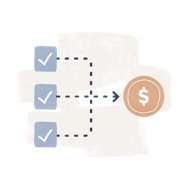When Ingrid Murray took over Prospect Cleaning Service Inc. in 2014, she didn’t have direct experience in the janitorial industry. But she did have an accounting background and the drive to grow the business — a commercial janitorial service started by her husband — beyond the $75,000 or so a year it had been earning.
While she knew she would do whatever it took to make it a success, she likely had no idea that in just a couple of years she would grow the business by 6X, to nearly $450,000 in revenue in 2016. And part of that journey would involve a microloan would help her take her business to the next level.
Prior to Murray taking over the business, new jobs were financed on retained earnings. But that limited growth. She had spent hours researching the commercial janitorial and services industry at the library, and determined it was a very viable industry with plenty of room for growth. But, “the way we were doing it wouldn’t get us the dollar signs I was looking for,” says Murray.
Among her first steps were to develop her expertise and tap into every available resource. She set about earning her Minority- or Women-Owned Business (MWBE) certification. She became a member of the Business Services Contractors Association International, and enrolled in the Cleaning Management Institute to earn a certificate in bidding and estimating.
She also applied for the Goldman Sachs 10,000 Small Businesses program and was accepted. She says the program was invaluable in helping her learn how to market her business. “We were trained how to create a growth plan as opposed to a business plan,” she says.
Her Obstacle: A Client That Paid Late
Despite a rapid growth in revenues, there were definite challenges. One was a client that was not paying on time. While the business’s bills were due (including taxes), without payment from the client, it was a struggle to make the deadlines. “We had invested almost $90,000 in that client,” she says.
So she tried to get financing to bridge the gap while she waited for payment. She was turned down by a couple of lenders and wound up taking an expensive business cash advance loan. “Biggest mistake I ever made,” she says. The client continued to drag its feet on payments, and in the meantime, the lender was dipping into her bank account daily to get paid, creating a serious cash flow crunch.
Fortunately, through a contact in the 10,000 Small Businesses program she was introduced to Excelsior Growth Fund, a Community Development Financial Institution (CDFI) and small business lender in New York state. With their help, she was able to refinance the business cash advance. The terms were much more reasonable, and she got some breathing room.
Despite her initial success, Murray found it difficult to get financing, in part because she wasn’t looking for a very large loan. Smaller loans, also known as “microloans,” aren’t particularly profitable for traditional banks. “Responsible providers of microloans and other neighborhood community organizations can be a good strategy for acquiring the capital you need,” says Steven R. Cohen, president of Excelsior Growth Fund.
At the end of 2016, Prospect Cleaning Service Inc. landed a large government contract. The downside? Murray had to purchase supplies and machinery, and increase her insurance, which cost another $50,000. Since payment on one of those contracts takes at least 30-60 days, she was again facing a cash crunch. Murray once again turned to Excelsior Growth Fund, which was able to provide an affordable term loan.
That loan has been pivotal to the firm’s growth, says Murray. “I just got an invitation to bid on another huge contract,” she says. “If I didn’t have that loan I wouldn’t even have the deposit I need to bid on that contract. It takes you into another league.” She sees it as a domino effect; as she takes on bigger and bigger contracts, she’ll be able to bid on even larger ones. “The government isn’t going to trust me with a $2 million contract if I am a $100,000-a-year business,” she notes. And Murray wants to continue to grow her business. “I want it to be huge,” she says.
How to Replicate Ingrid’s Success
If you want to bid on government contracts, keep in mind that your business must have a D-U-N-S number. (You can get a DUNS number here.) You should also have a strong Paydex score. Your business credit may be reviewed for government contracts, contracts with large retailers, and when applying for business insurance.
If your capital needs are relatively small — $50,000 or less, for example — consider a microloan, which may be cheaper than other small-dollar lending options. (Loan amounts may go as high as $250,000, but the average microloan is $13,000, according to the SBA.) Some microlenders have less stringent credit requirements, and may even work with newer businesses with solid prospects for growth.
Photo courtesy of Ingrid Murray.
This article was originally written on March 21, 2017.



Remarkable